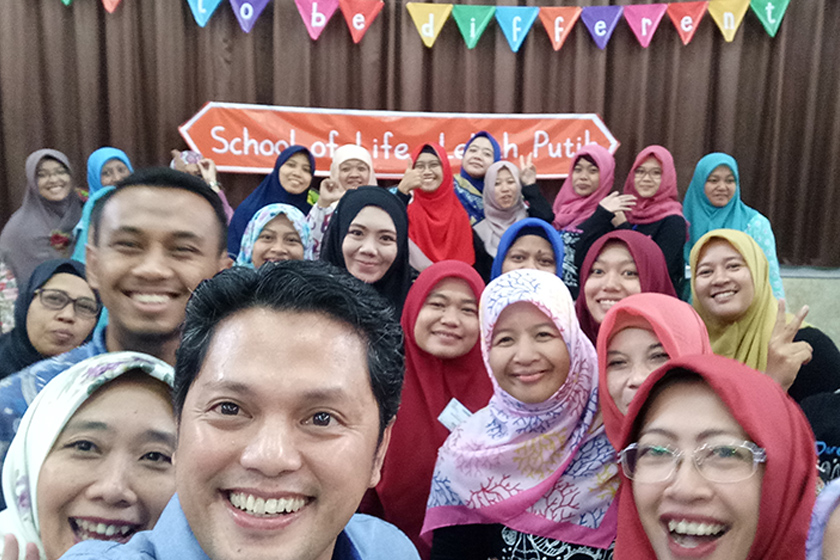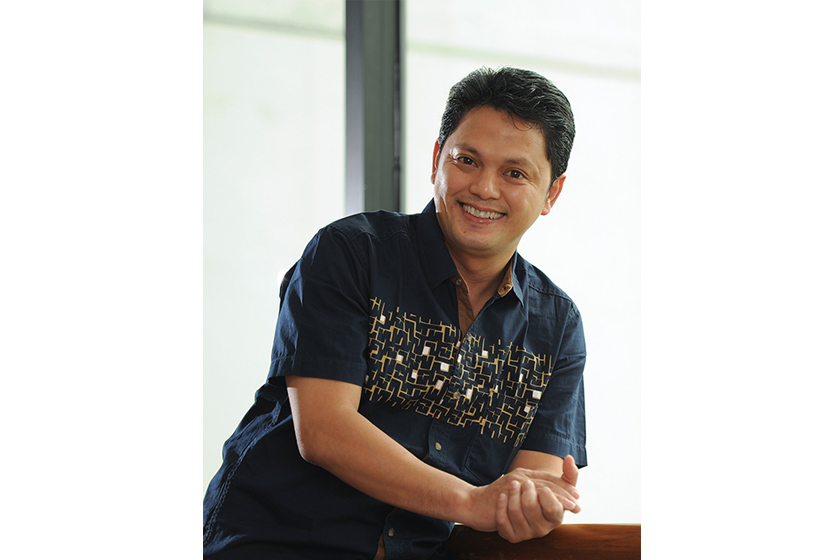School is a place where we get inspired and make friends before we set off towards our dream careers. However, for some, school can be a gruelling chore. Muhammad Nur Rizal, a Monash University graduate, believes the school experience should be fun.
“School should be a fun place for children, so they can be happy. When they’re happy, their motivation to study will grow and hopefully they will continue learning for the rest of their lives,” he said.
In 2013, Rizal launched the Gerakan Sekolah Menyenangkan, or Fun School Movement, which aims to create an education system that emphasises personalised learning. His inspiration came during his stay in Australia.
“My children went to Clayton North Primary School. Me and my wife saw positive changes in their character. When they returned from school or after vacation, they were eager to go back to school. They always missed school,” he said.
Rizal wanted to find out more about what made his children love their school so much. So he sat in their school, spoke to their teacher, and saw the difference in the teaching system. Rizal saw that the Australian style of personalised learning was more egalitarian.
“They were more independent, caring and more socially sensitive,” he said. “It was a drastic change.”
Rizal was reminded of the principles of Ki Hajar Dewantoro, Indonesia’s first education minister. Dewantoro, also known as the Father of Education, had three principles of leadership in education: to set an example, to inspire freewill, and to provide support.
“The Indonesian education system has deviated from Ki Hajar Dewantoro’s principles, which inspire character building and personality,” Rizal explained.
“The education system now prioritises standardisation, where students are assessed in the national examination.
“Before independence, many Indonesians who studied abroad implemented values that they learned to liberate their thinking and fight against the occupiers,” he said.
“We think that the Indonesian rising means to revolutionise the way of thinking, the way of learning in facing the global challenges ahead.
“The Indonesian curriculum keeps changing because we do not yet have a long-term road map.”
Indonesia will receive a “demographic bonus” by 2030, where the population within a productive age is much higher than the unproductive group (the elderly and children).
But Rizal worried that without high-level thinking ability, the phenomenon will not be a bonus but a boomerang.
“Examinations only demand that students memorise, which is the lowest thinking level, that is why we scored very low in the International Student Assessment,” he said.
Rizal also observed that people are easily divided during election campaigns where facts are confused by hoaxes and hate mongering, especially on social media.
“This is not only caused by lack of technological aptness, but our education system is to blame for the inability to create an independent and critical population,” he said.
The Fun School Movement vision is in line with the Indonesian Government’s Nawacita – the nine priority agenda – in education which is 70% character building and 30% knowledge in primary education.
Since Rizal and his wife Novi Poespita Chandra founded the Fun School Movement when they were both doing their PhDs in Melbourne, they have gained around 60 volunteers, including students from University of Gadjahmada Yogyakarta (UGM), education university IKIP, and student’s parents.
They have three activities – intervention in schools through seminars and workshops; teaching assistance; and research involving UGM and Monash University.
“We involve psychology and information technology students because the future of education will be technology based,” he said. “Workshops are delivered and designed by The Fun School Movement and supported by the Clayton North Primary School.”
The movement has produced two books. Sekolah itu Asyik or School is Fun, was written by 28 Indonesian PhD students all over Australia. Sekolah Nir Kekerasan or School Without Violence, was written by 25 Indonesian writers from four continents.
Rizal wants the Fun School Movement to remain at the grassroots, rather than the government level. He has met the former education minister and although his staff welcomed the idea and included it in their strategic plan, Rizal said he had not seen it in any programs on the ground yet.
“My suggestion to the new minister is to change the approach into education that encourages the liberation of thinking, and do that through personalised learning,” he said.
“We want to build positive relations between Indonesia and Australia through people-to-people connections. Education is one of the main gates to build this relationship,” Rizal added. Recently, the Fun School Movement project received funding from the Alumni Grant Scheme this year.
For more information about his Alumni Grant Scheme project, please click here.



 Bringing Fun Back Into Education
Bringing Fun Back Into Education
